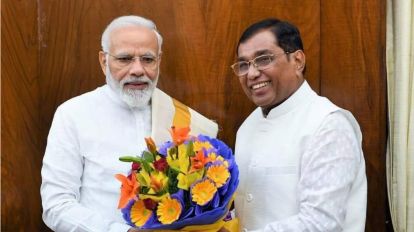DR.KIRITI SOLANKI 4 TIME BJP..MP,Ahemdabad.Gujarat was not given seat to contest.Why?
Report card for Ahmedabad West: BJP MP Kirit Solanki’s MPLAD funds lowdown, questions asked in Parliament
Even before the delimitation, a Congress leader was last elected in the 1984 Lok Sabha elections in Ahmedabad Lok Sabha constituency, which remained a BJP stronghold after 1989.
 Dr. Kirit Solanki with Prime Minister Narendra Modi. (Source: Facebook/Dr Kirit Solanki)
Dr. Kirit Solanki with Prime Minister Narendra Modi. (Source: Facebook/Dr Kirit Solanki)The constituency came into existence in 2008 following the delimitation exercise in Ahmedabad. Since 2009, BJP’s Dr Kirit Solanki, a laparoscopic surgeon by qualification, is the only leader that the voters of the constituency have sent to the lower house of Parliament.
Even before the delimitation, a Congress leader was last elected in the 1984 Lok Sabha elections in Ahmedabad Lok Sabha constituency, which remained a BJP stronghold after 1989. In 1977, Ahmedabad elected Congress’s Ehsan Jafri, who was killed in the Gulbarg society massacre in the 2002 riots, as its MP.
The BJP has fielded Dinesh Kodar Makhwana from the seat this time.
Profile overview
Solanki has not been a minister. However, he has been the chairperson of the Parliamentary Committee on Welfare of SCs (scheduled castes) and STs (scheduled tribes) for the last five years. He has also been a member of other key panels, including the Standing Committee on Finance; Consultative Committee, Ministry of Environment, Forest & Climate Change; and Joint Committee on the Personal Data Protection Bill, 2019
MPLAD funds lowdown
Dr Solanki says that a major chunk of his MPLAD (Members of Parliament Local Area Development Division) funds were focused on education and health sectors. These included providing facilities for ‘smart schools’, providing equipment for games in schools, ceramic tiles with educative prompts (images of alphabets, numbers), providing water purifiers to schools. Among his works in health, Dr Solanki says he provided ‘ICU on Wheels’ to the Ahmedabad Civil Hospital.
“In multiple schools across my constituency where I funded sports and games equipment, teachers tell me that they now see an increased attendance of students and they come to school an hour earlier, just so that they can play. I took up initiatives in the education and health sector and not particularly infrastructure projects because firstly infrastructure is quite good in Ahmedabad and further for infrastructural demands, I could always pursue the Ahmedabad Municipal Corporation to get those done,” Dr Solanki says.
Questions asked in Parliament
The BJP leader has asked a total of 226 questions so far. He sought details on a range of matters from different ministries, including MEITY (Ministry of Electronics and Information Technology), MOHFW (Ministry of Health and Family Welfare), Panchayati Raj, Consumer Affairs and Food and Public Distribution, commerce and industry, communications, cooperation, culture, chemicals and fertilisers, heavy industries and public enterprises, environment, education, science and technology, law and justice, agriculture and farmers’ welfare.
Some key questions:
February 7, 2020: The BJP leader asked the Centre if the government was considering the implementation of blockchain technology in public healthcare system. To this, the Central government replied that NITI Aayog is studying the same and an appropriate decision will be taken on whether to use the technology after assessing the cost benefit analysis of the technology.
June 24, 2019: Solanki asked if the government introduced or was planning to introduce courses on Astrology as a part of the Pradhan Mantri Kaushal Vikas Yojana (PMKVY). There “are presently no job roles under PMKVY 2016-20 for Astrology” — this was the response he received.
Number of debates that saw participation: 102
During one of the discussions, he urged the government to enact a model framework law to regulate online games across the country, citing that legal provisions vary state to state, creating a “lopsided” legal regime. He also advocated that doctors from Pakistan, who are given Indian citizenship, be allowed to practise in India.
He was part of the Joint Parliamentary Committee on the Personal Data Protection Bill 2019. As a member, according to Solanki, he had advocated for restricting sharing of personal data with social media sites such as Facebook (Meta) and Twitter (now X).
He also introduced a private members’ bill in 2019 seeking to amend the Scheduled Castes and the Scheduled Tribes (Prevention of Atrocities) Act, 1989 “with a view to bring in ragging, segregation of students as per caste and labelling students as reserved category students unfavourable treatment in the category of offence under the parent Act and to put a check on such unlawful activities”.
He has repeatedly urged the government to provide medical care and subsidised medicines to economically weaker patients suffering from Lysosomal Storage Disorders (LSD) and rare disorders. He also requested the government to consider a proposal for reservation of SCs and STs in the private sector “to correct historical injustices”, citing the National Sample Survey Office(NSSO) data that shows that the share of SCs and STs in private enterprises is much less than their share in the population and that SC entrepreneurs and their businesses also face discrimination in accessing inputs and services.
In March 2020, he had also urged the government to take steps in training psychiatrists and counsellors to set up more institutes like the National Institute of Mental Health and Neurosciences (NIMHANS).




Comments
Post a Comment